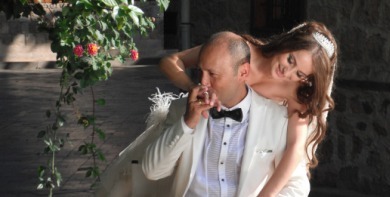Interested in modern Turkish weddings? Want to know how they differ from traditional wedding ceremonies in Turkey? Read on for more facts & information…
Although many of the traditional wedding and pre-wedding rituals remain unchanged in rural areas, Turkish weddings in urban settings have some differences from traditional ceremonies. While there are tales of wedding celebrations lasting 40 days, there is no evidence to verify these stories. It was common for wedding feasts to last two or three days and affluent rural families still adhere to this tradition. Weddings were generally held at the home of the bride or one of her relatives, but this custom is impractical in cramped urban homes. Most weddings are now held in hotels, community centers and other wedding venues.
Henna Parties
Modern Turkish weddings may last only a few hours since the cost of renting a hall is high. Pre-wedding rituals like the henna party the night before the wedding are typically held in the bride’s home. Engagement parties are still an important event, often more lavish than the actual wedding, and are usually held in rented facilities if the family resides in an urban area. Since the beginning of the 20th century, Turkish brides have chosen to wear white, Western style gowns and modern grooms usually wear tuxedos if the wedding is formal. Most Turkish weddings are formal although the ceremony is civil rather than religious.
Signing The Legal Documents
Little has changed in the ceremony itself which is brief and devoted to signing the necessary legal documents. A government official presides over the ceremony and vows and wedding rings are not usually exchanged. Some couples do opt to exchange rings and have an imam read from the Quran or offer a blessing at the conclusion of the official ceremony and this is a deviation from traditional practices. Modern brides and grooms have more say in their wedding celebrations which were once arranged entirely by their parents.
Delayed Marriages
In Turkey, as in other nations, many modern couples choose to delay marriage until they complete a college education or establish themselves in a career. They may opt to pay for part or all of their wedding preparations and make the decisions about the celebration themselves. While the practice of parents arranging their children’s marriage has not completely stopped, it is far less common, especially among couples in their twenties or thirties with successful careers and financial independence from their parents.
Modern Turkish weddings still have many elements of Turkish tradition including music, dance and food, but clothing and wedding cakes have more in common with European ceremonies than with the Turkish celebrations of the past.





